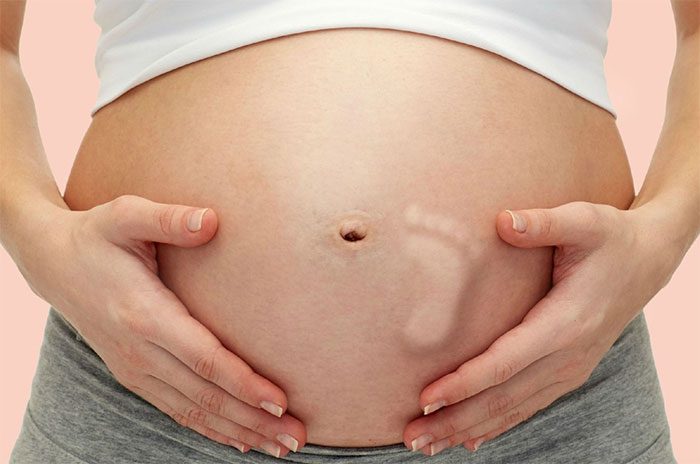The centuries-old mystery of why fetuses kick their mothers’ bellies has finally been solved.
Fetuses begin to move, squirm, and kick their mothers’ bellies from the 16th week of pregnancy. These spontaneous movements have long been thought to occur randomly. However, new research has revealed that the fetus kicking the mother’s belly has a purpose.

Scientists at the University of Tokyo (Japan) have uncovered new information about fetal kicking. (Photo: Shutterstock).
The study was conducted by scientists at the University of Tokyo and published in the Proceedings of the National Academy of Sciences. Through this research, scientists found that fetuses “exercise” while still in the womb, playing a crucial role in the development of the baby’s body, including the development of hand-eye coordination skills.
According to a previous study published in the Journal of the Royal Society Interface, an average kick in the womb can exert a force of over 10 pounds. This issue has puzzled scientists for centuries. However, recent research models have revealed that kicking the mother’s belly actually helps newborns learn how to control their bodies, according to the New York Post.
While previous studies on newborns focused on joint movements or specific body parts, this new research examined muscle activity and sensory signals across the entire body.
Specifically, the research team used technology to record the movements of 12 healthy newborns under 10 days old and 10 infants around 3 months old. Through a musculoskeletal computer model to monitor muscle activity and sensory signals, researchers discovered that muscle interaction patterns were developed based on the random exploratory behaviors of the infants, which then helped them perform sequential movements.
Professor Hoshinori Kanazawa, the lead author of the study, stated that people often assume that the development of the sensory-motor system generally depends on the occurrence of repeated sensory-motor interactions. In other words, the more you perform a similar action, the more likely you are to learn and remember that action.
However, the results from the University of Tokyo research team indicate that infants develop their own sensory-motor systems based on exploratory behavior or curiosity. Thus, infants do not merely repeat one action but engage in various different actions.
The researchers further noted that gaining a better understanding of how the sensory-motor system develops could help us learn more about the origins of human movement, as well as identify early diagnoses of developmental disorders.
Another recent study also showed that if expectant mothers consume one alcoholic drink per week during pregnancy, it could affect the baby’s brain. Babies exposed to low or moderate levels of alcohol are at risk of changes in brain shape, and the process of cognitive development may also slow down.


















































